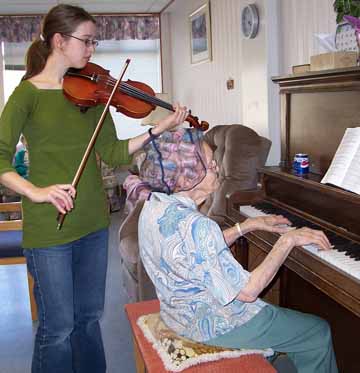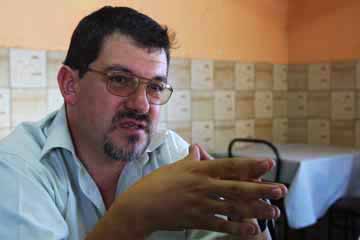Canadian Mennonite
Volume 10, No. 13
June 26, 2006

Hard to forget—after all those years
Winnipeg
 |
My grandmother, Anne Loewen, started playing piano and organ in her church at the age of 13. That was in 1927, 79 years ago.
When our family moved my grandparents into a seniors home last spring, we found—in her piano bench—two thick stacks of programs, one from weddings and one from funerals. My grandmother was the accompanist for all of them. They are the reminders of her 60-year career—from 1927 to 1987—as a music teacher and church accompanist.
Besides these special events, my grandmother also played piano and organ in many Sunday morning services for much of her life, in addition to teaching piano to a number of children for 25 cents a lesson, all the while raising four children of her own.
This might sound like a somewhat ordinary career. After all, this is what a trained musician does. But what makes my grandmother’s situation remarkable is the era in which she did it. She had a career as a professional musician at a time when it was common for women to abandon any thoughts of a profession upon getting married, even if they had completed training and had proven talented in their chosen field. This was a time when society frowned on wives and mothers working outside the home, although, technically, she did not leave the house to teach piano.
Not only was my grandmother a professional, but a large part of her time was dedicated to voluntary service in the church. She “worked” for six decades in what is now commonly called “music ministry.” As a female, my grandmother was part of the ministry in a church that, as recently as the 1990s, rejected a pastor because she was female.
As her granddaughter, I greatly admire her dedication to the church despite its prejudices against her gender.
For the past decade or so, my grandmother has been losing her memory. It has been a gradual process, but still very difficult to deal with. The family found comfort in the fact that her musical abilities were nearly unaffected by memory loss; she could still play from the hymnal. I would bring my violin when we visited, so we could play together when the conversation got too circular and repetitive.
In April, the unthinkable happened. When I sat my grandmother down at the piano, she placed her hands on the keys and produced not the usual beauty of four-part hymns, but clashing notes and musical gibberish. She could not recognize the well-known hymns, and it seemed her musical gift had finally been taken from her. What a terrible loss!
In May, when I visited again, I brought my violin, prepared to play for her, instead of with her. To my surprise, she hummed along to every hymn I played! So she did remember the familiar songs.
Soon she got restless, so I convinced her to come with me to the piano. Imagine my joy when she could play, not perfectly—and not the difficult hymns, but she could play! Her gift had not yet been taken!
As we continued playing, she even improvised, adding richness to the chords of the hymns. I guess when a person does something for nearly 80 years, it isn’t very easy to forget. Thank God.
Preaching a gospel of social change in Chile
Conchali, Chile
 |
Omar Cortes-Gaibur believes strongly that the church and the government in Chile need to work together to effect positive social change. And the International Ministry worker for Mennonite Church Canada Witness has evidence that this is possible. The 5&2 Multiplying for All organization, that began in 2000 as a church-sponsored shelter for abused women, morphed into the Prevention Center for Domestic Violence two years ago.
The transition of this church-based organization occurred in partnership with city hall and the national women’s affairs ministry. It was recently recognized by the federal government as “one of the best teams” in the country.
But the challenges of social reform in Chile are many, so Cortes-Gaibur has little time to sit still. Last year, he helped establish “Sanctuaries of Peace,” a neighbourhood abuse and domestic violence-prevention program that involves local churches.
Becoming a Sanctuary of Peace requires congregations to become part of a violence-prevention campaign in their neighbourhood. Churches commit themselves to respectful treatment of others and to be a place of support for victims of violence and abuse. Then local government joins with the community to proclaim the church as a Sanctuary of Peace.
Six churches are receiving training to deal with cases of abuse and domestic violence, while sending specific cases for professional treatment, reports Cortes-Gaibur. “People will recognize this as a place where young and old can find refuge from abuse or violence,” he says.
Cortes-Gaibur hopes the program will eventually take root in other churches, cities and countries. Conchali mayor Carlos Sottoloccio, in the presence of 50 evangelical pastors, asked, “Can you imagine how we could change the face of our city if just 50 percent of your churches are part of this significant program?”
The program has caught the attention of UNICEF, which is now offering sponsorship and training. The significance of such affirmation is enormous. Since it began a year ago, more churches have expressed interest, in spite of obstacles.
“The main barrier in having churches adopt this program is that domestic violence exists within their communities also. They seek to avoid the topic,” Cortes-Gaibur says.
“It is impossible in Latin America to develop theological activity without having one’s feet in the midst of people’s problems,” he adds. “It is tension-filled, it is difficult and tiring, but it is part of the cross in Latin America.”
Although he teaches at a seminary, edits books on theology, and sits on a planning team for the fifth Latin American Evangelism Congress, Cortes-Gaibur is always working at ways to put the theological rubber on the road.
“My ministry [seeks] to create an ambiance of collaboration between churches, overcoming denominational differences in the common desire to serve the kingdom of God. Many churches of different denominations are interested in learning from the Anabaptist model and its peace theology,” he says.
“They are very receptive if the message is presented effectively as an alternative, a third way. There is a sort of saturation with traditional evangelical discourse and it is lamentable that many Mennonite churches in Latin America do not go back to their roots and transmit the Anabaptist message in the midst of the urgent need that we have in our continent.”